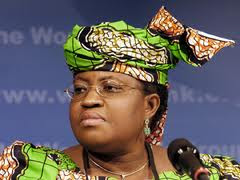The Federal Government has spent N1.440 trillion on recurrent and capital expenditures in the last six months just as it has set up a committee made up of bankers and fuel importers to manage subsidy. These facts were disclosed, yesterday, by Finance Minister, Dr. Ngozi Okonjo-Iweala.
Okonjo-Iweala, while addressing newsmen in Abuja, said a committee made up of bankers and petroleum product importers had been set up to ensure accountability in the management of fuel subsidy funds, noting that payment would commence at the end of the investigation.
She said: “We need to verify 2011 arrears to make sure the arrears were paid to the people that imported fuel. It is to make sure that payments are made correctly. Of the N888 billion appropriated for subsidy in 2012, N451 billion of that were arrears for 2011. It was at this point that I directed that we slow down payment to make sure that payments are genuine.
“Once we verify that the payments are genuine, we move ahead. But if we verify that the payments are not genuine, we would ask for our money back from the importers. N17 billion has been release against 2012 fuel delivery, but we are taking care until the report of our investigation is in our hands.
“This exercise was not designed to stop marketers. Things are going on at the moment, but we want to make sure that we are not stampeded into making payment, we are taking things serious, but it would not cause any hiccups.
There are many ships on the high sea and we will have the investigation concluded by next week.”
According to her, government has so far spent N1.036 trillion on recurrent expenditure while N404 billion has been released for capital expenditure.
But she lamented that only N94.1 billion of the N404 billion released for capital project had been utilised by government ministries, departments and agencies despite being cash backed to the tune of N239.8 billion.
The amount spent represents a mere 39 per cent of the capital releases for first and second quarters of 2012.
FG generates N1.29trn
The minister also said the Federal Government generated N1.29 trillion as revenue within the period.
She said: “N304 billion was released for first quarter of 2012 and it was cashed backed with N239.8 billion. Only 39 per cent of it has been spent or N94.1 billion, meaning that we have 61 per cent still available for spending.
“We have also released N100 billion for the second quarter of 2012. We have released N404.1 billion until today so that the agencies can have money to spend on capital projects. We will work hard to release the third quarter within a month.”
Why slow implementation of capital projects
On the slow pace of implementation of capital projects, she said it was because the 2011 budget was extended to March 2012.
She assured that government would soon begin yearly implementation of budgets between January and December, starting from 2013 to ensure proper implementation of budgets.
According to her, “the performance on the capital projects was not surprising given that last year’s budget was extended to March. But we are doing away with that system. Budget 2013, God willing, will start in January and end in December.”


























